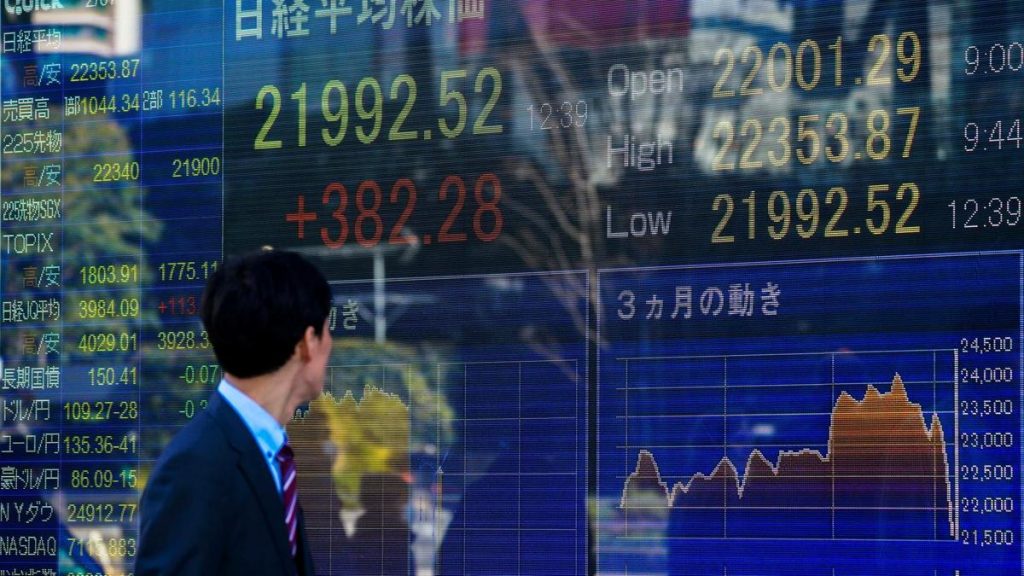Reduce Asian stock fall this week. The dollar reached a 20-year high

- MSCI Asia ex-Japan +1.5%, Nikkei +2.61%
- Shares set for second week of losses on inflation, tightening worries
- Dollar remains near 20-year highs on safe-haven demand
Reduce Asian stock fall: By Andrew Galbraith SHANGHAI (Reuters) – Asian shares found some footing after a volatile session for U.S. equities, but the dollar remained at 20-year highs and global stocks near 18-month lows on worries about persistently high inflation and tightening central banks.
NEW YORK : World equities fell on Thursday to an 18-month-low, with markets dogged by fears high inflation would persist and force central banks to keep tightening monetary policy.
SHANGHAI (Reuters) – Asian shares trimmed losses on Friday after a volatile session for U.S. equities, while the dollar hovered near 20-year highs as investors continued to digest worries about persistently high inflation and tightening central bank policy.

Those concerns ultimately overcame hopes on Wall Street that high inflation might be peaking, pushing the S&P 500 close to confirming a bear market on Thursday, at nearly 20% off its January all-time high.
In an interview later in the day, U.S. Federal Reserve Chair Jerome Powell said that the battle to control inflation would “include some pain”. And he repeated his expectation of half-percentage-point interest rate rises at each of the Fed’s next two policy meetings, while pledging that “we’re prepared to do more”.
But after sharp losses a day earlier, Asian shares bounced higher on Friday morning.
MSCI’s broadest index of Asia-Pacific shares outside Japan was up 1.5% from Thursday’s 22-month closing low, trimming its losses for the week to around 3%.
Australian shares were up 1.53%, while Japan’s Nikkei stock index jumped 2.61%.
In China, the blue-chip CSI300 index was up 0.41% and Hong Kong’s Hang Seng rose 2.21%.
“We had some pretty big moves yesterday, and when you see those big moves it’s only natural to get some retracement, especially since it’s Friday heading into the weekend. There’s not really a new narrative that’s come through, ” said Matt Simpson, senior market analyst at City Index.
Reduce Asian stock fall
NEW YORK : World equities fell on Thursday to an 18-month-low, with markets dogged by fears high inflation would persist and force central banks to keep tightening monetary policy.
In the United States, stocks ended a whipsaw session slightly lower, as investors juggled fears of nagging inflation with signs it could be peaking. The S&P 500 came within striking distance of confirming a bear market since swooning from its all-time high reached in January.
In Europe, economic worries were exacerbated by a German warning that Russia was now using energy supplies as a “weapon.”
Europe’s continent-wide STOXX 600 index was down 0.75 per cent. MSCI’s gauge of stocks across the globe was down 0.69 per cent, as of 5:09 p.m. ET (2109 GMT).
That flagship global index is nearly 20 per cent lower for the year.
The Dow Jones Industrial Average fell 103.81 points, or 0.33 per cent, to 31,730.3, the S&P 500 lost 5.1 points, or 0.13 per cent, to 3,930.08 and the Nasdaq Composite added 6.73 points, or 0.06 per cent, to 11,370.96.
The dollar climbed to a 20-year high, as global economic fears boosted its safe-haven appeal.
“I think there comes that point where you run out of sellers. I’m not really certain that this is going to be a buying rally at the moment, possibly a short-covering rally ahead of the weekend.”
The moves higher in equities were mirrored in slipping U.S. Treasuries, with the benchmark U.S. 10-year yield edging up to 2.8895% from a close of 2.817% on Thursday.
The policy-sensitive 2-year yield was at 2.5941%, up from a close of 2.522%.
“Within the shape of the U.S. Treasury curve we are not seeing any particularly fresh recession/slowdown signal, just the same consistent marked slowing earmarked for H2 2023,” Alan Ruskin, macro strategist at Deutsche Bank, said in a note.
The U.S. dollar remained near 20-year highs, supported by safe haven demand as Russia bristled over Finland’s plan to apply for NATO membership, with Sweden potentially following suit.
Moscow called Finland’s announcement hostile and threatened retaliation, including unspecified “military-technical” measures.
Reduce Asian stock fall
The dollar index, which tracks it against a basket of currencies of other major trading partners, edged down about 0.1% to 104.64. But the greenback was stronger against the yen , which traded at 128.95 per dollar after hitting a two-week peak of 127.5 hit overnight.
The European single currency was 0.15% firmer at $1.0395 after trading lower earlier in the day.
Cryptocurrency bitcoin also turned higher, cracking through $30,000 after the collapse of TerraUSD, a so-called stablecoin, drove it to a 16-month low of around $25,400 on Thursday.
In commodities markets, oil prices were higher against the backdrop of a pending European Union ban on Russian oil, but were still set for their first weekly loss in three weeks, hit by concerns over inflation and China’s COVID lockdowns slowing global growth.
U.S. crude ticked up 1.28% to $107.49 a barrel, and global benchmark Brent crude was up 1.5% at $109.06 per barrel.
Spot gold, which had been driven to a three-month low by the soaring dollar, was up 0.23% at $1,825.86 per ounce.
(Reporting by Andrew Galbraith; Editing by Simon Cameron-Moore)






